Announcing the Inaugural Rising Stars in Engineering in Health
RISING STARS IN ENGINEERING IN HEALTH WORKSHOP
Workshop Dates:
2021: Friday-Saturday, November 19-20, 2021
2020: Friday, December 18, 2020
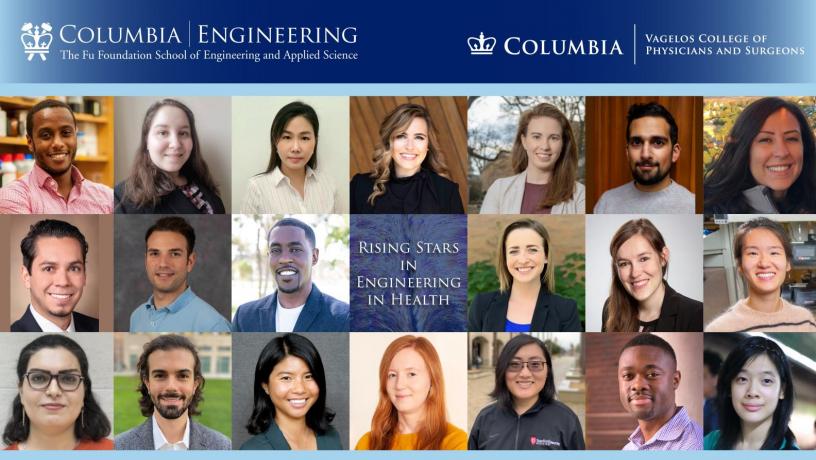
CONGRATULATIONS TO THE 2020 RISING STARS IN ENGINEERING IN HEALTH!
On Friday, December 18, 2020, twenty selected Rising Stars in Engineering in Health and over 100 faculty and workshop applicants from around the globe convened virtually for a day of educational sessions and research presentations that explored the interface between engineering and biomedicine. The enthusiastic audience of postdocs, researchers, and senior graduate students tuned in via Zoom to hear from several faculty panelists from both the Engineering School and the Medical School at Columbia. The speakers offered a plethora of advice on how to apply and interview for a faculty position in biomedicine, and how to negotiate and start up a lab. The day ended with short research presentations by the Rising Stars, followed by one-on-one mock interviews where each Rising Star was paired with a faculty member for a 20-minute interview and feedback session.
On behalf of the Fu Foundation School of Engineering and Applied Science and the Vagelos College of Physicians and Surgeons at Columbia University, we thank all of our panelists and our amazing workshop participants for a successful inaugural event!
GET TO KNOW OUR RISING STARS!
Daniel Abebayehu
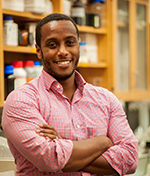
My long-term research interests entail exploring the intersection of immunology and regenerative medicine to develop therapies for tissue repair and wound healing. In particular, I am interested in investigating immuno-stromal axes to determine avenues for intervention that prevent fibrosis and promote repair. I completed my undergraduate training at the University of Virginia with Dr. Edward Botchwey where I was able to study how fiber orientation and incorporating basement membrane proteins into electrospun scaffolds improved the ability of biomaterial implants to promote neural regeneration. As a PhD student with Dr. John Ryan at Virginia Commonwealth University, my research focused on investigating how scaffold morphology and scaffold degradative byproducts can alter the response from innate immune cells. These skills equipped me for my subsequent postdoctoral work with Dr. Thomas Barker at the University of Virginia to continue exploring the intersection of immunology and regenerative medicine, specifically focusing on fibrosis and fibroblast heterogeneity.
Bethany Almeida
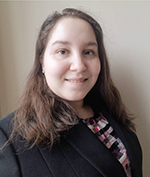
Bethany Almeida is an American Society for Engineering Education Postdoctoral Research Fellow in Dr. James Delehanty's research group in the Center for Bio/Molecular Science and Engineering at the US Naval Research Laboratory. Previously, she received her PhD from Brown University in Biomedical Engineering where she worked with Dr. Anita Shukla. Bethany is currently on the faculty job market for tenure-track, Assistant Professor positions in Bioengineering or related fields, and her research focuses on the design of advanced biomaterial platforms to improve stem cell therapies with applications in musculoskeletal and neural tissue engineering and regenerative medicine, as well as immunoengineering. She has received numerous awards and recognitions, including, most recently, the 2020 Biomedical Engineering Society National Meeting Career Development Award.
Gloria Bora Kim
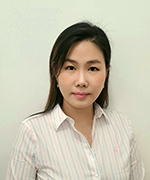
I am a biomedical engineer with a chemical engineering background with 15 years of research, development, and manufacturing experience in developing small, large molecule drugs, and cell therapies. During my Ph.D. training in biomedical engineering at the Pennsylvania State University when I developed targeted drug delivery systems using immune cells and nanosized drugs for solid cancers, I found passion in immunotherapies. Then, I started my NCI postdoctoral training at the Center for Cellular Immunotherapies in the Perelman School of Medicine of the University of Pennsylvania, developing T cell receptor-based immunotherapies for different cancers. I was also awarded a Brody Family Medical Trust Fund Postdoctoral Fellowship. Leveraging my industry and academic research experience, my research lab will focus on merging material science and genetic engineering of T cells to develop next generation T cell-based therapies that eradicate different solid tumors with specificity, reduced toxicity, and the ability to overcome tumor-associated immunosuppression.
Kelsey Collins

Kelsey received her PhD in Biomedical Engineering in 2017 in Dr. Walter Herzog’s lab at the University of Calgary. Kelsey was supported by multiple fellowships and her work on diet-induced obesity in a preclinical model of osteoarthritis was acknowledged with a J.B. Hyne Innovation Award. In the Guilak Laboratory at Washington University in St. Louis, Kelsey has created a niche in adipose-cartilage signaling, stem-cell biology, synthetic biology, and drug delivery to evaluate systemic contributors and novel therapeutic strategies in osteoarthritis and rheumatoid arthritis. Kelsey’s work on a mouse model of lipodystrophy was accepted at Proceedings of the National Academy of Sciences and was acknowledged with a New Investigator Recognition Award from the Orthopaedic Research Society in 2020. As an independent investigator, Kelsey will test specific mechanistic hypotheses to separate inflammation, metabolic disorders and musculoskeletal health using tissue engineering and regenerative medicine approaches to generate novel disease-relevant therapeutic targets for osteoarthritis.
Stephanie Cone
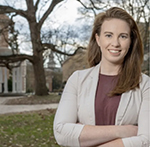
Stephanie Cone is a postdoctoral fellow in the University of Wisconsin Neuromuscular Biomechanics Lab researching non-invasive techniques for characterizing tendon function during dynamic tasks. She received her BS in Biomedical Engineering from the University of Arkansas in 2014 and her PhD in Biomedical Engineering from the North Carolina State University and the University of North Carolina Joint Department of Biomedical Engineering in 2019. There she studied structural and functional changes in the knee during growth in the Translational Orthopaedics Research Lab.
Santiago Correa
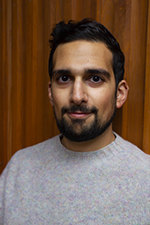
Santiago (Santi) is interested in the intersection of materials science and immunotherapy. His postdoctoral research in the Appel Lab is focused on developing injectable hydrogels that stimulate the immune system to recognize and eliminate cancer. Santi is especially interested in leveraging the unique drug delivery capabilities provided by such materials systems in order to explore combination immunotherapy and the role of release kinetics on therapeutic efficacy and safety.
Prior to his postdoctoral work, he received his BS in biomedical engineering from Yale and his PhD in bioengineering from MIT. At MIT, he worked in the Hammond Lab where he investigated the role that surface chemistry plays in the tumor-targeting behavior of nanoparticles. Santi became fascinated by engineering nanoparticle surfaces through supramolecular and covalent modifications to simultaneously control functions such as cellular affinity, subcellular trafficking, and theranostic capabilities.
Gonca Erdemci-Tandogan
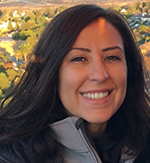
Gonca Erdemci-Tandogan is a postdoctoral fellow at the Institute of Biomedical Engineering at the University of Toronto. She received her Ph.D. in Physics from the University of California, Riverside, where she studied the physics of viruses. She is a Fulbright alumna and was the recipient of Outstanding Ph.D. Graduate award from UCR Department of Physics. After her Ph.D., she worked as a postdoctoral associate at Syracuse University, investigating the mechanisms underlying tissue and organ formation. Currently, she explores the mechanical regulation of cell shapes and coordination during wound repair and morphogenesis in the fruit fly embryo. Dr. Erdemci-Tandogan’s main research goals focus on understanding the fundamental physical mechanisms underlying complex biological processes using multidisciplinary approaches.
Juan Gnecco
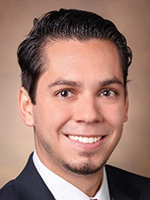
Dr. Gnecco is a postdoctoral fellow who aspires to an academic career in gynecological research and now leads the 3D endometrium team in the Griffith Lab at MIT. He received his PhD in Molecular Pathology and Immunology at Vanderbilt in 2018, working with renowned endometriosis investigator Dr. Kevin Osteen. At MIT, Gnecco has pushed frontiers in two areas – 3D imaging of lesion structure using tissue clearing and light-sheet imaging, and development of 3D co-culture models of patient-derived endometrial organoids with stromal and endothelial cells, to capture the physiology of both the eutopic endometrium as well as ectopic lesions, the former in health and disease.
Tomas Gonzalez-Fernandez
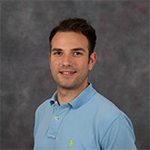
Tomas Gonzalez Fernandez is an American Heart Association Postdoctoral Fellow at the University of California Davis, under the supervision of Prof. Kent Leach. He is also the TERMIS America Student and Young Investigator Section Communications Officer. His research interests are 3D bioprinting and tissue engineering for the repair of damaged musculoskeletal tissues.
Leopold Green
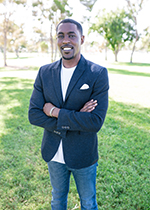
Leopold N. Green, Ph.D., is a Postdoctoral Fellow in the Department of Biology and Biological Engineering at the California Institute of Technology. Dr. Green received his bachelor’s degree in Chemistry from Hampton University in 2011. During his undergraduate studies, Dr. Green received the Ronald E. McNair Fellowship, the UNCF Merck Science Initiative fellowship, and The Hampton University 2011 Future Nobel Laureate award. Dr. Green transitioned to the University of California, Riverside Department of Bioengineering, where he engineered nucleic acid-based nanostructures and coupled their mechanical properties to a synthetic transcriptional oscillator for his doctoral studies. Dr. Green received the Ford Fellowship Honorable Mention, the GAANN undergrad fellowship, and the NSF Graduate Research Fellowship. After completing his Ph.D. in 2017, Dr. Green joined Caltech, where he applies synthetic biology tools to engineer microbial systems as living therapeutics for medical applications. Dr. Green is an NSF California Alliance for Graduate Education and the Professoriate fellow.
Katherine Hixon
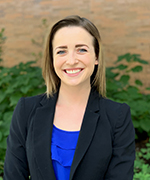
Katherine Hixon received her B.S. in Biomedical Engineering (minors: Mathematics and Human Physiology) from the University of Iowa in 2014. She then pursued a Ph.D. in Biomedical Engineering at Saint Louis University. Here, her research broadly included tissue engineering/regenerative medicine, focused on scaffold fabrication to target critical-size bone defects and craniofacial/maxillofacial congenital conditions. This resulted in 18 manuscripts and book chapters, over 10 as first-author, as well as two patents in process. In 2018, Katie began a postdoctoral position in the Department of Orthopaedic Surgery at Washington University in St. Louis. After five months, she submitted a successful NIH F32 Ruth L. Kirschstein National Research Service Award (NRSA) proposal to study the development and rescue of an atrophic nonunion model. Katie’s long-term career goal is to establish a laboratory focused on biomedical engineering/craniofacial surgery and conduct cutting-edge research utilizing models of craniofacial anomalies to drive the development of novel therapies.
Elisa Kallioniemi
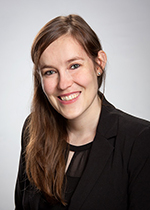
I am a fourth-year Postdoctoral Research Fellow in the Department of Psychiatry at the University of Texas Southwestern Medical Center (UTSW), Dallas, Texas. By training, I am a biomedical engineer and a medical physicist with a longstanding interest in the neurophysiological effects of non-invasive electromagnetic brain stimulation. In my research, I combine concepts from engineering and medicine to find novel aspects to improve and develop new brain stimulation methods and treatments. My research is targeted at severe psychiatric disorders, such as psychosis and depression. At UTSW, my primary research efforts focus on studying the effects and predictors of response for magnetic seizure therapy.
Jina Ko
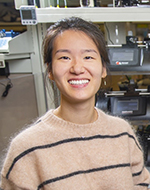
Jina Ko is the Schmidt Science Fellow at Massachusetts General Hospital and the Wyss Institute at Harvard University. In 2013, she graduated from Rice University with a B.S. in Bioengineering and a B.A. in French Studies. In 2018, she earned her Ph.D. in Bioengineering at the University of Pennsylvania. During her Ph.D., she worked in the Issadore lab that combines microelectronics, microfluidics, and nanomaterials to develop miniaturized platform for disease diagnosis. She focused on the development of machine learning-based microchip diagnostics that can detect blood-based biomarkers (e.g. extracellular vesicles; EV) to diagnose two extremely challenging diseases, pancreatic cancer and traumatic brain injury. For her postdoctoral training, she made a pivot to chemistry and molecular biology and has focused on the development of single biomarker detection technologies. She has recently developed new methods to profile single cells and EV with high throughput and multiplexing.
Neda Latifi
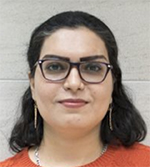
Neda Latifi received her PhD in soft tissue engineering at McGill University in October 2018. During her PhD studies, she developed a phono-mimetic perfusion bioreactor and a tissue-mimetic hybrid injectable hydrogel biomaterial. She served as the president of the Canadian Biomaterials Society-Montreal Chapter. She is currently a postdoctoral research fellow working with Professor Craig Simmons in the Translational Biology and Engineering Program at the University of Toronto. Her postdoctoral research is focused on pediatric heart valve tissue engineering. She has developed pig-derived engineered tissue sheets for preclinical studies in a porcine model. Further, she investigates the effects of different biochemical stimuli on the biosynthesis activity of human umbilical cord mesenchymal stromal cells. Her research spans tissue-mimetic biomaterials, cell-biomaterial interactions, autologous mesenchymal stromal cells, and bioreactors. Her ultimate goal is to develop functional engineered load-bearing tissues as one-time tissue replacements capable of growth and repair in the human body.
Giovanni Offeddu
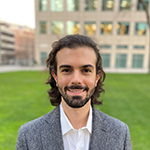
Giovanni Offeddu is a Postdoctoral Fellow in the Department of Biological Engineering at the Massachusetts Institute of Technology, working in Roger Kamm’s laboratory on engineered vascular models. He received his B.Eng./M.Eng. in Materials Science and Engineering from the University of Manchester, U.K, in 2012. He earned his Ph.D. in Engineering from the University of Cambridge, U.K., in 2016, advised by Michelle Oyen and Ruth Cameron. He was the recipient of an Engineering and Physical Sciences Research Council (EPSRC) full Ph.D. Studentship, an American Italian Cancer Foundation (AICF) Postdoctoral Fellowship to study breast cancer metastasis, and a Junior Investigator Research Award from the BMES Advanced Biomanufacturing Special Interest Group (ABioM), among other awards. Offeddu’s research interests focus on biomaterials, organ-on-chip systems, vascular and cancer biomechanics, and on the application of quantitative engineering methods to understand biological phenomena.
Feini (Sylvia) Qu
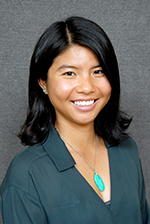
Interdisciplinary training in tissue engineering, biomaterials, bioinformatics, and veterinary medicine has prepared me for a career in musculoskeletal regenerative medicine. My research focuses on (1) understanding how cells coordinate tissue regeneration after injury and (2) modulating the cellular response and wound microenvironment to guide regeneration. For my doctoral work, I developed tunable nanofibrous scaffolds that sequentially delivered multiple therapeutic biofactors to tears of the knee meniscus to improve endogenous cellular repair in vivo. As a postdoctoral fellow, I am using molecular, bioinformatic, and transgenic techniques to elucidate the dynamic transcriptional landscape underlying murine digit tip regeneration. My work identified a gene regulatory network that recapitulates aspects of limb development, as well as progenitor cell populations that mediate digit regrowth after amputation. My long-term career goal is to develop therapeutics that promote tissue repair and regeneration after injury, especially with respect to the bone and connective tissues of limbs and joints.
Elena Sizikova
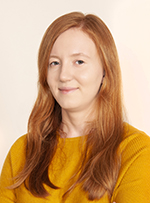
Dr. Elena Sizikova is Moore Sloan Faculty Fellow/Assistant Professor in the Center for Data Science, New York University (NYU). She received her BA in Mathematics and Computer Science from the University of Oxford, UK in 2013. She completed her PhD in Computer Science at Princeton University in July 2019, where she was NSF Graduate Research Fellow in the 3D Vision Lab advised by Professor Thomas Funkhouser. During her PhD studies, she spent time as a research intern at Siemens Healthineers and Adobe Research. She has received best paper awards at the ECCV 2016 Workshop on Virtual and Augmented Reality (VARVAI) and the EUROGRAPHICS 2016 Workshop on Graphics and Cultural Heritage (GHC). Elena's research focuses on developing new computational methods and algorithms in computer vision which aim to address pressing challenges in medical imaging, biomedical research, and more generally visual understanding tasks.
Shang Song
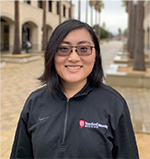
Dr. Shang Song is currently a post-doctoral fellow at the Stanford University. She graduated with Ph.D in Bioengineering from the Joint Program at University of California, Berkeley and San Francisco (UC Berkeley & UCSF). She received her Bachelor’s degree in Biomedical Engineering with Honors from Brown University. She is interested in developing novel diagnostic devices and therapeutic methods for regenerative and translational medicine. She was awarded scholarships and fellowships from organizations such as National Institute of Health Ruth L. Kirschstein Research Service Awards (NRSA) (F32), Stanford University Dean’s Postdoctoral Fellowship, National Science Foundation Graduate Research Fellowship (NSF-GRFP), 30 under 30 in Healthcare by Forbes Magazine, Gates Millennium Scholar amongst others. In addition to her research interest, she has been leading translational initiatives and serving as a reviewer on peer-reviewed journals while holding multiple patents relating to cell encapsulation technologies.
Yvon Woappi
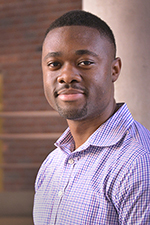
Dr. Yvon Woappi is currently a postdoctoral fellow in the Harvard Dermatology Research Training Program at Brigham and Women’s Hospital/Harvard Medical School. I completed my undergraduate studies at the University of Pittsburgh, majoring in Biology. I then went to pursue a PhD in Biomedical Sciences at the University of South Carolina School of Medicine. There, I developed a 3D cell culture system to study the relationship between epithelial regeneration and virus-induced neoplasia. Currently, my postdoctoral work utilizes in vivo gene editing systems to understand the contribution of epithelial cell lineages in tissue regeneration and cancer. In the future, I hope to lead an independent research program exploring the genomic modulators of epithelial tissue renewal and carcinomas. Toward this aim, I am currently completing K99/R00 training and will be applying for tenured-track faculty positions in the near future.
Connie Wu
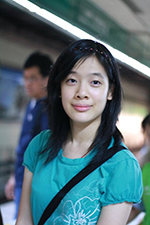
Connie is an NIH F32 Ruth L Kirschstein postdoctoral research fellow in Dr. David Walt's lab at Brigham and Women's Hospital and the Wyss Institute for Biologically Inspired Engineering, working on developing ultrasensitive point-of-care diagnostic platforms based on single molecule detection. She obtained her Ph.D. in chemical engineering from MIT as an NSF Graduate Research Fellow, working in Dr. Paula Hammond's lab on polymer-based RNA interference delivery systems for cancer therapeutics. In her future work, Connie plans to apply materials engineering approaches to profile the biomolecular fingerprints of synthetic materials in biological fluids, for discovering disease-associated biomarker signatures and predicting individual responses to nanomedicines and other drugs.
Workshop Schedule
Resources
